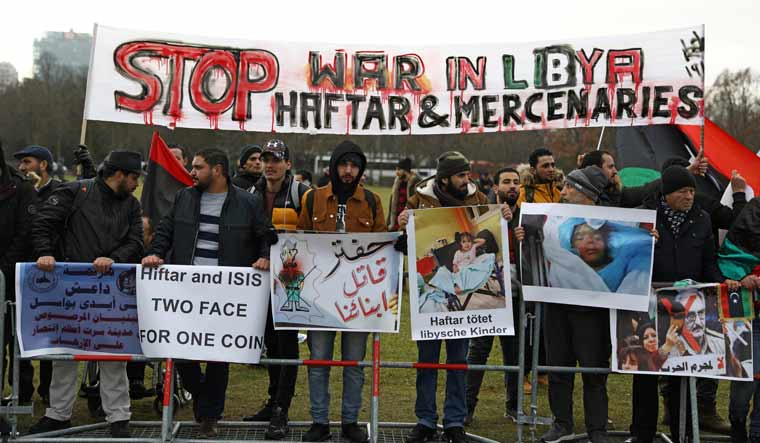With peace talks aimed at putting an end to Libya’s six-year-long second civil war set to begin in Berlin on Sunday, loyalists of rebel commander Khalifa Haftar have blocked oil exports from the main ports in a bid to cripple the main income source of the war-ravaged oil economy.
The Libyan National Oil Company said the disruption would result in the country’s daily crude production dropping from 1.3 million barrels a day to 500,000; a loss of $55 million a day.
The move is seen as a response to Turkey shoring up its military presence in support of president Fayez al-Sarraj on January 2. While Al-Sarraj heads the government in Tripoli, the UN-recognised Government of National Accord (GNA) that has been in power since 2016, Haftar enjoys the support of several foreign powers, leading forces in the east of the country with his base in the city of Tobruk.
“Our line at the UN is clear. Don’t play with petrol because it’s the livelihood of the Libyans”, warned Libya’s envoy to the UN Ghassan Salame.
Speaking to AFP, he said, “All foreign interference can provide some aspirin effect in the short term, but Libya needs all foreign interference to stop.”
Haftar has led a powerful offensive against Libyan forces since July 2019, leading to over 2,000 soldiers and 200 civilians being killed. He had served as a military leader under Muammar Gaddafi, taking part in the 1969 coup that brought Gaddafi to power. His forces hold sway over Libya’s Eastern regions.
Sunday will see world leaders assemble in Berlin, as well as Sarraj and Haftar, in hopes of settling a peace agreement. German chancellor Angela Merkel will be present, as will the presidents of Russia, Turkey, France and other nations.
While Turkey supports the GNA, the UAE, Russia and Italy support Haftar’s forces. Merkel has said that enforcing a UN-backed arms embargo on Libya will be a priority at the summit—a stance likely to affect fellow EU members Italy and France, who are accussed of supporting Haftar.
Salame called for the setting up of international “protection troops” in case Haftar continues his offensive.
“Such a protection force must operate under the auspices of the United Nations. Experts will have to advice who should participate, such as the EU or the African Union or the Arab League,” he told German newspaper Die Welt on Sunday.
The UN mission in Libya expressed its concern over the blockade on Saturday. “This move would have devastating consequences first and foremost for the Libyan people who depend on the free flow of oil for their well-being,” a statement read.
The warring sides declared a ceasefire on January 12 in a move backed by Russia and Turkey. However, the ensuing peace talks in Moscow failed to result in a truce.
With inputs from agencies


